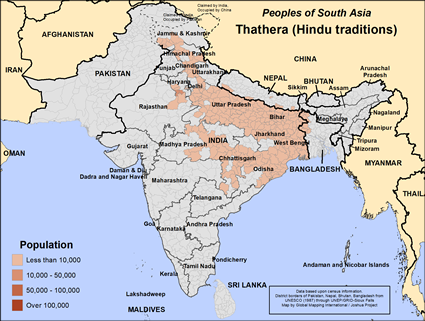Thathera (Hindu traditions) in India

Photo Source:
Anonymous
|

Map Source:
People Group data: Omid. Map geography: UNESCO / GMI. Map Design: Joshua Project.
|
| People Name: | Thathera (Hindu traditions) |
| Country: | India |
| 10/40 Window: | Yes |
| Population: | 365,000 |
| World Population: | 365,000 |
| Primary Language: | Hindi |
| Primary Religion: | Hinduism |
| Christian Adherents: | 0.00 % |
| Evangelicals: | 0.00 % |
| Scripture: | Complete Bible |
| Ministry Resources: | Yes |
| Jesus Film: | Yes |
| Audio Recordings: | Yes |
| People Cluster: | South Asia Hindu - other |
| Affinity Bloc: | South Asian Peoples |
| Progress Level: |
|
Introduction
The Thathera moved from Rajasthan in the 1800s and came to live in Rewari, located in the small north Indian state of Haryana. Today they live all over northern India. The Thathera are divided into 47 clans. They earn a living in metal work, selling and repairing of household utensils. Many are cultivators of land. In Bihar, many are jewelers. They have a caste council to settle problems regarding divorce and property rights.
Ministry Obstacles
There are probably no Christ followers among the Thathera, so whoever tries to reach them for Christ will need to gather groups of believers. That is easier said than done, but individual evangelism almost always ends with only one or two people.
Outreach Ideas
Pray for the Followers of Christ
Pray for the Entire People Group
Pray that Christ's ambassadors will go to the Thathera in friendship and love and earn the privilege to give them the gospel.
Pray for a strong movement to Christ to result in many being discipled so that they can lead victorious lives.
Pray that the Holy Spirit will draw them to live without fear and that they can worship the Lord without concern about what others think.